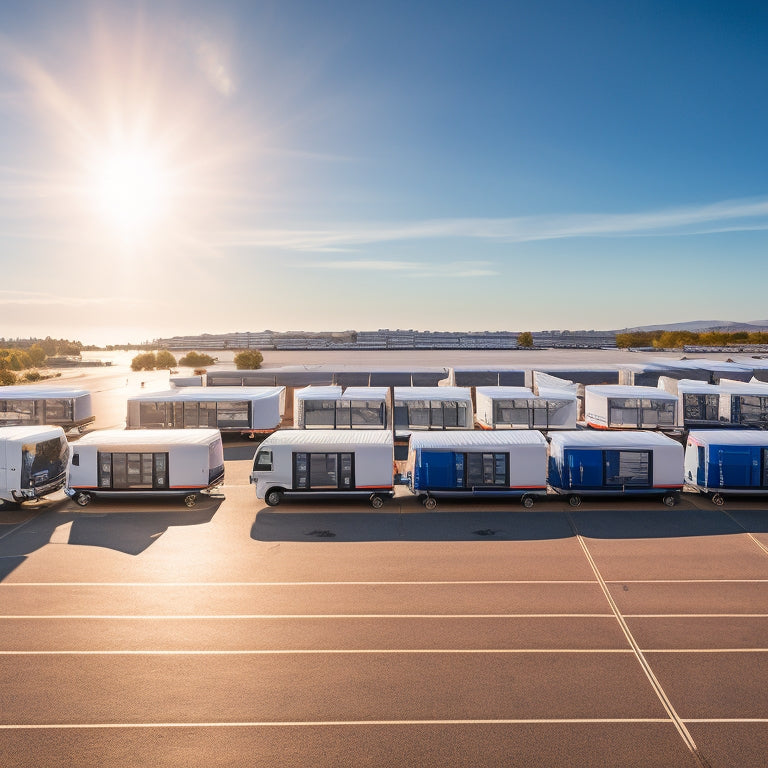
What Are the Best Solar Panel Kits for Fleets?
Share
You're looking for a reliable and efficient solar panel kit to power your fleet. To make the best choice, consider kits with high-efficiency ratings, adjustable mounting options, and durable components. Evaluate the kit's compatibility with your fleet's specific energy requirements and assess the supplier's reputation and warranty options. By choosing the right solar panel kit, you'll improve fuel efficiency, reduce emissions, and minimize environmental impact. Now that you know what to look for, discover the top solar panel kits for fleets that meet your needs and take the first step towards a more sustainable future.
Key Takeaways
• Evaluate the energy needs of your fleet to choose a solar panel kit that meets your specific power output requirements.
• Consider the quality and reliability of the solar panel kit, including the type and quality of components.
• Assess the kit's compatibility with your fleet's electrical infrastructure and structural integrity.
• Look for kits with high-efficiency ratings, peak power ratings, and suitable operating temperature ranges.
• Research the supplier's reputation, warranty options, and maintenance requirements before making a decision.
Benefits of Solar Panels for Fleets
What advantages can solar panels bring to your fleet operations?
If you're considering integrating solar panels into your fleet, you're likely wondering what benefits they can bring. One notable advantage is improved fuel efficiency. By harnessing the sun's energy, you can reduce your reliance on traditional fuel sources, leading to substantial cost savings and reduced emissions. In fact, solar panels can increase fuel efficiency by up to 20%, depending on the size of your fleet and the amount of solar energy generated.
Another critical advantage of solar panels is their minimal environmental impact. Traditional fuel sources are major contributors to greenhouse gas emissions, which exacerbate climate change. By switching to solar power, you can significantly decrease your fleet's carbon footprint. This not only benefits the environment but also enhances your organization's reputation as a responsible and sustainable business.
With solar panels, you can decrease your environmental impact while improving your bottom line. By investing in solar panels, you're making a smart decision for your business and the planet.
Top Solar Panel Kit Features
When selecting a solar panel kit for your fleet, you'll want to take into account the top features that'll guarantee peak performance. Two key aspects to focus on are system compatibility and energy output, as these factors directly impact your fleet's ability to harness solar power efficiently.
System Compatibility
To guarantee smooth integration and peak performance of your fleet's solar panel kit, it is crucial to evaluate the kit's system compatibility before making a purchase. This guarantees that the solar panel kit seamlessly integrates with your fleet's devices and network architecture.
When evaluating system compatibility, consider the following key factors:
| Compatibility Aspect | Description |
| Device Integration | Confirm that the solar panel kit is compatible with your fleet's devices, such as batteries, inverters, and charge controllers. |
| Network Architecture | Validate the kit's compatibility with your fleet's network architecture, including communication protocols and data transmission standards. |
| Electrical System | Verify the kit's compatibility with your fleet's electrical system, including voltage, current, and power ratings. |
| Safety Features | Ensure that the kit's safety features, such as overcharge protection and short-circuit protection, align with your fleet's safety standards. |
Energy Output
A solar panel kit's energy output is a critical top feature to take into account, as it directly impacts your fleet's ability to generate power efficiently. When selecting a solar panel kit, you want to make sure it can produce enough energy to meet your fleet's power needs.
A kit's energy output is typically measured in watts (W) and is affected by factors like panel efficiency, size, and number of panels.
Here are some key aspects to keep in mind when evaluating a solar panel kit's energy output:
-
Peak Power Rating: Look for kits with a high peak power rating to guarantee maximum energy production.
-
Efficiency Rating: A higher efficiency rating means more energy is generated per unit area.
-
Panel Size and Number: Larger panels or more panels in a kit can increase overall energy output.
- Operating Temperature Range: Make sure the kit can operate efficiently in your fleet's typical operating temperatures.
Best Solar Panel Kits for Trucks
When outfitting your trucks with solar panels, you'll need to take into account two critical factors: truck bed mounting options and power output requirements.
You'll want to choose a kit that provides a secure and durable mounting system for your truck bed, ensuring the panels are safely and efficiently installed.
Additionally, you'll need to calculate the power output requirements of your truck's electrical systems to select a kit that meets your energy needs.
Truck Bed Mounting Options
Mounting solar panels on your truck bed requires a sturdy and adaptable system to withstand various driving conditions and maximize energy harvesting. You need a reliable mounting solution that can secure your solar panels firmly in place, guaranteeing they can withstand harsh weather conditions, bumpy roads, and frequent use.
When selecting a truck bed mounting option, consider the following key features:
-
Rust resistance: Look for mounting systems made from rust-resistant materials, such as anodized aluminum or stainless steel, to ensure durability and longevity.
-
Clamping systems: Opt for clamping systems that securely fasten the solar panels to the truck bed, providing a snug and stable fit.
-
Adjustability: Choose a mounting system that allows for adjustability, enabling you to customize the solar panel's angle and position for the best energy harvesting.
- Easy installation: Select a mounting system with a straightforward installation process, minimizing the time and effort required to get your solar panels up and running.
Power Output Requirements
As you select the best solar panel kit for your truck, determining your power output requirements is essential to make sure you can charge your batteries efficiently and meet your energy needs on the go. To do this, you'll need to calculate your load requirements, considering factors like the number of appliances you'll be powering, their wattage, and the number of peak hours you need to power them.
| Load Type | Peak Hours |
|---|---|
| Laptop | 4-6 hours |
| Fridge | 8-10 hours |
| Lights | 2-4 hours |
| Communication Devices | 6-8 hours |
| Medical Equipment | 12 hours |
When conducting load calculations, consider the total wattage of your appliances and the number of peak hours you need to power them. For example, if you need to power a laptop for 6 hours, you'll need a solar panel kit that can provide at least 300-400 watt-hours of energy. By accurately determining your power output requirements, you can make certain you have a reliable source of energy on the road.
Solar Panel Installation Considerations
You'll need to evaluate your fleet's energy requirements and available roof space to determine the ideal solar panel kit size and configuration. This assessment will help you identify potential installation challenges and guarantee a safe and efficient installation process.
When planning your solar panel installation, consider the following key factors:
-
Roof clearance: Confirm there's sufficient clearance between the solar panels and any rooftop obstacles, such as vents or skylights, to allow for proper airflow and maintenance access.
-
Electrical infrastructure: Verify that your fleet's electrical infrastructure can support the added power output from the solar panels, and that the electrical connections are secure and compliant with relevant regulations.
-
Structural integrity: Ensure that your fleet's roof can support the weight of the solar panels and withstand environmental stressors, such as wind and snow loads.
- Local building codes: Familiarize yourself with local building codes and regulations governing solar panel installations, and make sure that your installation meets or exceeds these standards.
Key Factors in Kit Selection Process
When selecting a solar panel kit for your fleet, three critical factors that should be taken into account are:
- The type and quality of components, the system's power output and efficiency, and the kit's compatibility with your fleet's specific energy requirements. These factors will directly impact the performance and reliability of your solar panel system.
You'll want to make sure that the components are durable and of high quality to minimize the risk of malfunction or failure.
The system's power output and efficiency will also play an important role in determining how well the kit meets your fleet's energy needs.
- Additionally, considering the supplier's reputation and warranty options can provide peace of mind and protect your investment.
Look for suppliers with a proven track record of producing reliable and efficient solar panel kits.
A thorough warranty can also provide financial protection in case the kit doesn't meet your expectations.
- By carefully evaluating these factors, you can make an informed decision and choose a solar panel kit that meets your fleet's unique needs.
Solar Panel Maintenance and Repair
Properly maintaining your solar panel kit is essential to ensuring peak energy output and extending its lifespan. As a fleet owner, it's important to prioritize regular maintenance to avoid reduced energy production and costly repairs.
Here are some essential maintenance tasks to keep your solar panel kit in top shape:
-
Panel cleaning: Regularly clean your solar panels to remove dirt, debris, and other obstructions that can reduce energy output.
-
Battery inspection: Perform regular battery inspections to identify potential issues before they become major problems.
-
Electrical connections check: Verify that all electrical connections are secure and corrosion-free to prevent energy losses.
- System monitoring: Regularly monitor your solar panel kit's performance to detect any issues or malfunctions.
Cost Savings With Solar Fleet Kits
By maintaining your solar panel kit, you'll reap the rewards of increased energy output and reduced maintenance costs, ultimately leading to significant cost savings over time. A well-maintained solar panel kit can improve fuel efficiency, reducing your fleet's reliance on fossil fuels and lowering operating expenses. Conducting regular cost analysis will help you identify areas where solar energy can optimize your fleet's performance.
One of the most significant advantages of solar fleet kits is the reduction in fuel costs. By harnessing renewable energy, you can reduce your fleet's fuel consumption, leading to substantial savings over time. Additionally, solar panels require minimal maintenance, which means you'll spend less on repairs and replacements. This, combined with the extended lifespan of solar panels, results in a significant reduction in maintenance costs.
As you consider investing in solar fleet kits, remember that the cost savings extend beyond fuel efficiency. By reducing your fleet's environmental impact, you'll also reduce regulatory compliance costs and potential fines associated with emissions. By investing in solar energy, you'll not only reduce your operating expenses but also contribute to a more sustainable future.
Frequently Asked Questions
Can Solar Panels Be Installed on Older Trucks or Just New Ones?
You can install solar panels on older trucks, but retrofit feasibility depends on vehicle compatibility, considering factors like roof size, weight capacity, and electrical system integration to guarantee a safe and efficient installation.
Do Solar Panels Interfere With Truck Antennas or Communication Equipment?
When installing solar panels on your truck, you'll want to make sure they don't interfere with radio frequency signals or cause electromagnetic interference with your communication equipment, such as antennas, to prevent signal disruption or safety risks.
Are Solar Panels Durable Enough to Withstand Harsh Weather Conditions?
You'll find that high-quality solar panels are designed to withstand harsh weather conditions, boasting weather resistance and climate endurance through rigorous testing, ensuring they can handle extreme temperatures, intense winds, and heavy precipitation.
Can I Customize Solar Panel Kits to Fit My Fleet's Specific Needs?
You think you're stuck with one-size-fits-all solar panel kits? Think again! You can customize kits to fit your fleet's specific needs, choosing from various kit options that prioritize energy efficiency and guarantee a safe, reliable power supply.
Will Solar Panels Void My Truck's Warranty if Installed Incorrectly?
When installing solar panels on your truck, you risk voiding the warranty if done incorrectly, so it's important to follow manufacturer guidelines to avoid installation risks and potential warranty implications.
Related Posts
-

How to Upgrade Your Home With Geothermal Innovations
You're now on the cusp of utilizing the Earth's natural thermal energy to revolutionize your home's heating and cooli...
-

Gamify Your Home's Energy Generation and Savings
You're taking the next step in optimizing your home's energy generation and savings by utilizing the power of gamific...
-

10 Best Energy-Efficient External Hard Drives for Sustainable Offices
When it comes to sustainable offices, you need external hard drives that balance data storage needs with energy effic...


